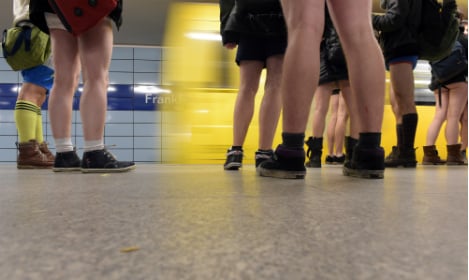All sorts of unusual passengers ride the Berlin metro – pets, homeless people, musicians, and even a flash mob of people with no trousers on in January this year during the “No Pants Subway Ride”.
But two recently uploaded YouTube videos show that a man took things one step further and nonchalantly rode the U1 and U4 lines completely naked, to the surprise of his fellow travellers, Tagesspiegel reports.
An elderly man, embarrassed by the whole spectacle, hid behind his newspaper at first but then offered it to the naked guy to cover himself up.
The videos have since been removed from YouTube.
But this wasn’t the first time that the mystery man had exposed himself in public.
Youtube Channel “Urban Nudist” displays further footage of him starkers in the Greek town of Thessaloniki and a second video showing him naked on the streets of Berlin.
BVG spokeswoman Petra Reetz could not confirm to The Local that the naked man actually travelled on the U-Bahn recently, arguing that the videos could have been made a few years ago.
However, she did have something to say about the Berlin metro dress code.
Nudity “is not welcome” on the underground, and counts as “causing public disturbance”, Reetz said.
Though there is no specific dress code, the BVG website states that metro users should “be considerate of other passengers”.
Although “there would be no punishment” for nudist metro-riders, “we would simply throw them out” and say “please get off the train!”, Reetz said.
Passengers should wear “appropriate clothing” she said, adding that wearing something inflammatory like a swastika would not be acceptable, but “If you get on the metro in a giraffe costume, it really doesn't matter to us.”
BVG’s disapproval of nudity on the Metro seems rather out of character for their normally easy-going stance towards passengers.
In December 2015, the company created a wildly successful ad campaign with the song “Is’ mir egal” (“I don’t care”) in which a rapper walks up a metro train explaining how the BVG is relaxed about almost anything except for passengers riding without tickets.
“The message is this: Whoever you are, we love you and we’ll take you with us”, Kazim Akboga told the Berliner Zeitung.
Just not if you're stark naked.
By Verity Middleton



 Please whitelist us to continue reading.
Please whitelist us to continue reading.
Member comments